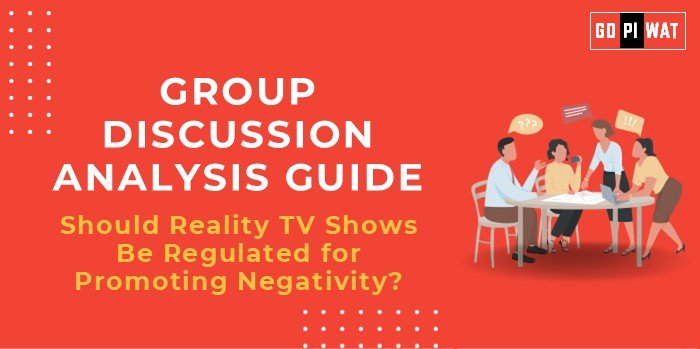📋 Group Discussion Analysis Guide: Should Reality TV Shows Be Regulated for Promoting Negativity?
🌐 Introduction to the Topic
- 📜 Opening Context: Reality TV shows, a global entertainment phenomenon, are often criticized for their potential to promote negativity, including toxic behavior, stereotypes, and mental health risks. Their impact on audiences, particularly impressionable young viewers, has sparked debates about the need for regulation.
- 📖 Topic Background: The concept of reality TV gained momentum in the early 2000s, focusing on unscripted drama and competition. However, controversies over ethical standards and societal impact have persisted. Recent incidents of contestant distress and public backlash have reignited the call for regulatory oversight.
📊 Quick Facts and Key Statistics
- 📺 Global Market Size: Reality TV accounts for 40% of global TV programming, highlighting its mass appeal.
- 🎭 Influence on Behavior: Studies indicate that 68% of young viewers imitate behaviors seen on reality TV shows.
- 🧠 Mental Health Concerns: 25% of reality TV participants report experiencing post-show anxiety or depression.
- ⚖️ Regulatory Landscape: Countries like the UK have established broadcast standards; India relies on self-regulation by producers.
👥 Stakeholders and Their Roles
- 🏛️ Regulators: Government bodies and media councils responsible for policy enforcement.
- 🎥 Production Houses: Responsible for content creation, often balancing TRPs and ethics.
- 👥 Viewers: The audience shapes the demand and feedback for such shows.
- 🩺 Psychologists and Activists: Advocates for participant well-being and content moderation.
🏆 Achievements and Challenges
✨ Achievements
- 📈 Increased Viewer Engagement: Shows like “Bigg Boss” have garnered immense TRPs and public interaction.
- 🌟 Platform for Talent: Reality shows have launched the careers of many artists and performers.
- 🌍 Cultural Awareness: Some formats promote traditions and diversity.
⚠️ Challenges
- ⚖️ Ethical Concerns: Allegations of scripted drama and manipulation of participants.
- 🧠 Impact on Mental Health: Public scrutiny and competitive stress have led to adverse psychological effects.
- 🌐 Social Influence: Critics argue that glorification of conflicts and superficial ideals harms societal values.
Global Comparisons:
• The UK: “Love Island” faced scrutiny, leading to aftercare programs for participants.
• The US: “Survivor” has implemented ethics guidelines for challenges and portrayal.
Case Studies:
• India: Backlash against sensationalism on “Bigg Boss” fueled public debates on morality.
📢 Structured Arguments for Discussion
- 💬 Supporting Stance: “Regulations can safeguard ethical standards and protect vulnerable participants.”
- 🗣️ Opposing Stance: “Over-regulation might stifle creativity and audience appeal.”
- ⚖️ Balanced Perspective: “A collaborative approach between producers and regulators ensures creative freedom without compromising ethics.”
📈 Effective Discussion Approaches
- 💡 Opening Approaches:
- Begin with a statistic: “Reality TV influences 68% of young audiences, raising questions about content standards.”
- Use a case example: “The suicide of a contestant in Japan’s ‘Terrace House’ sparked a global conversation.”
- 💡 Counter-Argument Handling:
- “While TRPs are important, mental health statistics highlight the need for action.”
- “Independent monitoring can address content concerns without heavy-handed regulation.”
📊 Strategic Analysis of Strengths and Weaknesses
Strengths
- 🎭 High entertainment value.
- 🌍 Cultural promotion and diversity.
- 🌟 Talent discovery and career platforms.
Weaknesses
- ❌ Ethical breaches and controversies.
- 🧠 Risks to mental health of participants.
- 📉 Societal desensitization to conflicts and negativity.
Opportunities
- 📚 Develop mental health guidelines for participants.
- 📢 Promote uplifting and inspiring narratives.
- 🌐 Leverage digital platforms for broader, regulated reach.
Threats
- 📛 Loss of credibility due to scandals.
- 📈 Audience fatigue from repetitive formats.
- ⚖️ Regulatory backlash or overreach.
🎓 Connecting with B-School Applications
- 💡 Real-World Applications:
- Explore the marketing and ethical dimensions of reality TV as a business model.
- 💡 Sample Interview Questions:
- “How can reality TV balance profitability with societal responsibility?”
- “What role should advertisers play in regulating content standards?”
- 💡 Insights for B-School Students:
- Ethical leadership in media production and marketing.
- Audience behavior studies for strategic marketing campaigns.


